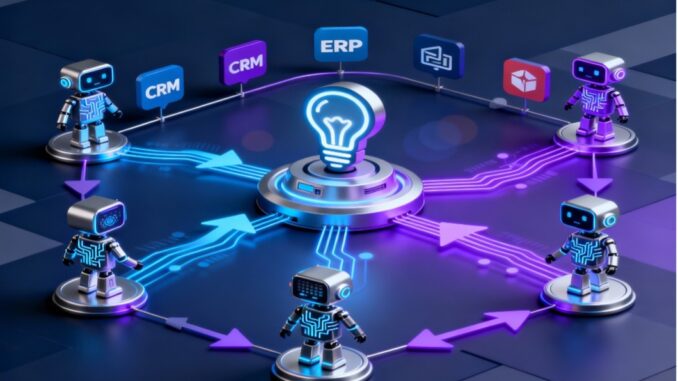
As organizations accelerate their digital transformation journeys, artificial intelligence (AI) is redefining how enterprise applications interact. From the growing landscape of SaaS platforms, AI is driving a shift toward smarter, faster, and more autonomous integrations. The emergence of Agentic AI — AI that can independently plan and act toward specific business outcomes — is taking enterprise automation to an entirely new level.
Traditional integrations between ERP, HCM, and SaaS systems were often complex, time-consuming, and heavily dependent on manual configuration, but AI is now making these processes not just automated, but intelligent — capable of predicting, optimizing, and even self-correcting without constant human input. In the past, integration teams spent countless hours mapping data fields, debugging connection errors, and fixing synchronization issues between enterprise systems. Today, with advanced automation and AI-assisted tools available through platforms like Oracle Integration Cloud (OIC) and the broader Oracle AI ecosystem, much of that manual work is being transformed. Through AI-assisted mapping suggestions, anomaly detection, and intelligent process automation, OIC users reduce manual effort, predict issues before they occur, and accelerate end-to-end business integrations. For instance, an organization connecting its HR and payroll systems can leverage AI to identify discrepancies in employee data, predict payroll conflicts, and trigger corrective actions before errors reach production. AI has evolved from being an assistant to becoming an intelligent advisor for integration teams.
The biggest leap is coming from Agentic AI — systems capable not only of predicting outcomes but acting on them autonomously. Agentic AI can orchestrate entire workflows across applications, learning and adapting as it goes. Imagine having intelligent AI assistants seamlessly supporting finance, HR, and supply chain operations — without the need to build everything from the ground up. AI agents are rapidly going mainstream, with more than a hundred pre-built, ready-to-use agents now available within Oracle’s ecosystem, developed by leading partners such as Deloitte, IBM, and Accenture, and integrated directly into Oracle applications. We see a future where digital assistants and AI agents evolve into trusted colleagues — learning continuously from your business, understanding your context, and delivering insights that are uniquely relevant to your role. But none of these matters without trust. That’s why it all rests on a governed, unified foundation powered by the Oracle AI Data Platform.
Let’s take a scenario where the HR system records a surge in new hires. An Agentic AI could instantly update user access in IT, trigger onboarding tasks, allocate budgets in finance, and adjust project planning — all without human intervention. It’s like having a digital operations manager running behind the scenes, ensuring every system stays synchronized.
Across industries, early adopters are experimenting with this concept. Large enterprises are piloting autonomous integration frameworks where AI agents monitor system performance, predict bottlenecks, and resolve issues in real time. Others are exploring Generative AI to design integration flows, which are then validated and deployed by Agentic AI agents — combining predictive intelligence with autonomous execution.
The benefits are clear: faster integration deployments, reduced manual errors, improved agility, and significant cost savings. By minimizing operational overhead, organizations can redirect their focus to strategic initiatives such as digital innovation, customer experience, and new product development.
Still, as with any transformative technology, challenges remain. Governance and transparency are key considerations. Enterprises must ensure AI-driven decisions are auditable, explainable, and compliant. Agentic AI brings autonomy, but human oversight remains essential — especially for critical financial or HR processes.
Looking ahead, experts believe we are moving toward fully autonomous enterprise ecosystems, where AI continuously learns, adapts, and enhances business processes across departments. In such environments, integrations won’t just connect systems — they’ll collaborate intelligently to align with business goals in real time.
In conclusion, I would say that AI and Agentic AI are not just changing integration, but they are redefining what an enterprise system can be — dynamic, responsive, and self-improving. Companies that embrace this shift will not just keep up with change — they’ll lead it.
Ms. Sadia Tahseen is an Oracle ACE implementing Oracle Integration solutions and setting strategic technology direction for large-scale enterprise clients. She has transformed complex technical landscapes into cohesive, secure, and user-friendly environments that drive operational efficiency, enhance customer satisfaction, and position organizations for long-term growth. She has distinguished herself as a thought leader through her published technology articles and frequent speaking engagements at OATUG and IEEE conferences.
